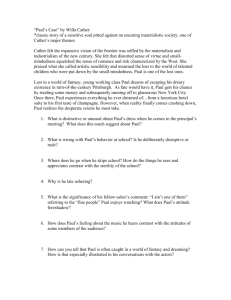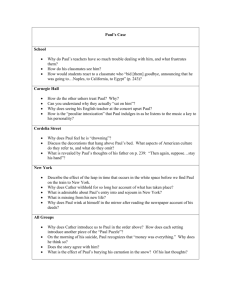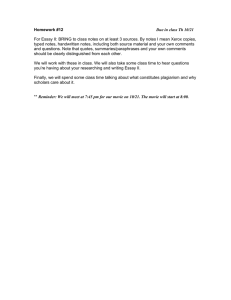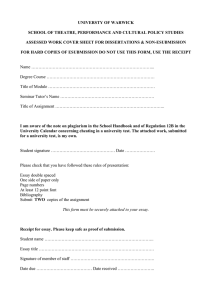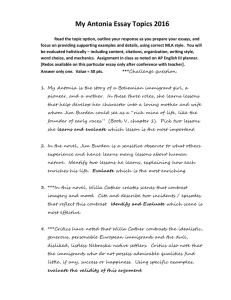Professor Clare Colquitt
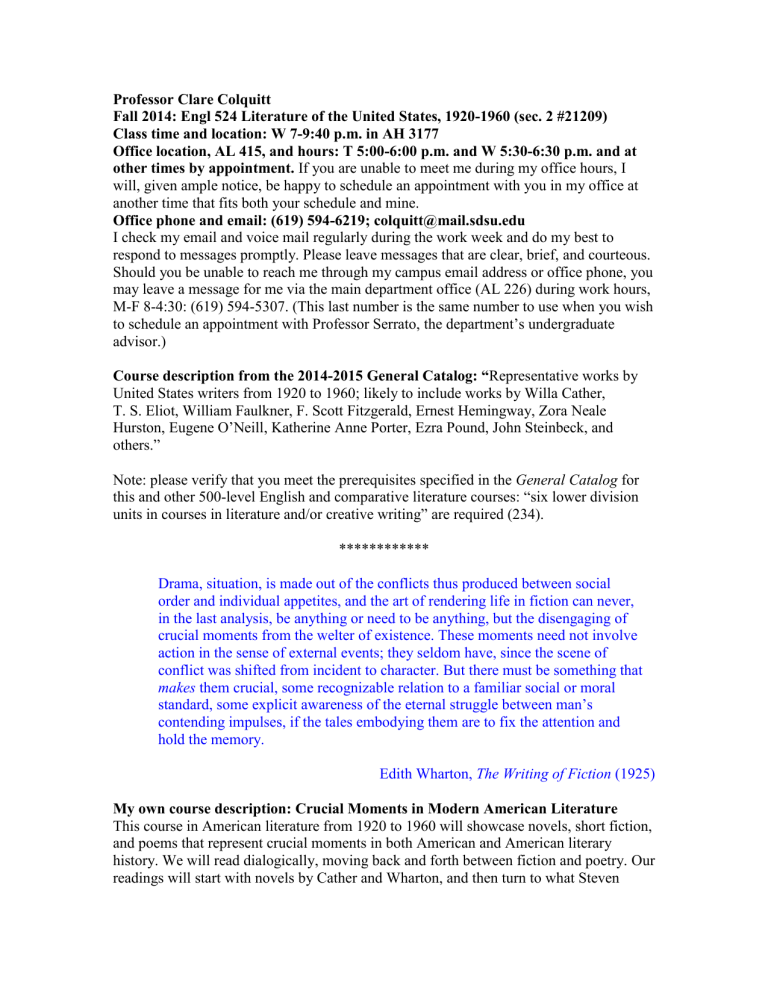
Professor Clare Colquitt
Fall 2014: Engl 524 Literature of the United States, 1920-1960 (sec. 2 #21209)
Class time and location: W 7-9:40 p.m. in AH 3177
Office location, AL 415, and hours: T 5:00-6:00 p.m. and W 5:30-6:30 p.m. and at other times by appointment. If you are unable to meet me during my office hours, I will, given ample notice, be happy to schedule an appointment with you in my office at another time that fits both your schedule and mine.
Office phone and email: (619) 594-6219; colquitt@mail.sdsu.edu
I check my email and voice mail regularly during the work week and do my best to respond to messages promptly. Please leave messages that are clear, brief, and courteous.
Should you be unable to reach me through my campus email address or office phone, you may leave a message for me via the main department office (AL 226) during work hours,
M-F 8-4:30: (619) 594-5307. (This last number is the same number to use when you wish to schedule an appointment with Professor Serrato, the department’s undergraduate advisor.)
Course description from the 2014-2015 General Catalog: “ Representative works by
United States writers from 1920 to 1960; likely to include works by Willa Cather,
T. S. Eliot, William Faulkner, F. Scott Fitzgerald, Ernest Hemingway, Zora Neale
Hurston, Eugene O’Neill, Katherine Anne Porter, Ezra Pound, John Steinbeck, and others.”
Note: please verify that you meet the prerequisites specified in the General Catalog for this and other 500-level English and comparative literature courses: “six lower division units in courses in literature and/or creative writing” are required (234).
************
Drama, situation, is made out of the conflicts thus produced between social order and individual appetites, and the art of rendering life in fiction can never, in the last analysis, be anything or need to be anything, but the disengaging of crucial moments from the welter of existence. These moments need not involve action in the sense of external events; they seldom have, since the scene of conflict was shifted from incident to character. But there must be something that makes them crucial, some recognizable relation to a familiar social or moral standard, some explicit awareness of the eternal struggle between man’s contending impulses, if the tales embodying them are to fix the attention and hold the memory.
Edith Wharton, The Writing of Fiction (1925)
My own course description: Crucial Moments in Modern American Literature
This course in American literature from 1920 to 1960 will showcase novels, short fiction, and poems that represent crucial moments in both American and American literary history. We will read dialogically, moving back and forth between fiction and poetry. Our readings will start with novels by Cather and Wharton, and then turn to what Steven
2
Gould Axelrod and others categorize as “first-generation modernist” poets, among them,
Frost, Moore, Williams, Jeffers, cummings, and Harlem Renaissance writers such as
McKay. After our study of Eudora Welty’s splendid collection, A Curtain of Green and
Other Stories (1941), and of poetry by second-generation modernists, primary among them Langston Hughes, we will conclude the semester by turning to two extraordinary novels: Ann Petry’s disturbing portrait of inner-city life, The Street (1946), and William
Faulkner’s genre-bending tour de force,
Go Down, Moses (1942).
Texts (editions ordered for Aztec Shops):
Axelrod, Stephen Gould, Camille Roman, and Thomas Travisano, eds. The New
Anthology of American Poetry . Vol 2: Modernisms, 1900-1950 (2005)
Willa Cather, My Antonia (Joseph Urgo, ed., Broadview 2003)
William Faulkner, Go Down, Moses (Vintage-Random, 1942)
Ann Petry, The Street (Mariner-Houghton,1946)
Eudora Welty, A Curtain of Green and Other Stories (Harcourt, 1941)
Edith Wharton, The Age of Innocence (Candace Waid, ed., Norton 2003)
If you do not already own the 7 th
edition of the MLA Handbook for Writers of Research
Papers, add this to your library soon. I will expect you to have a copy of this book and will assign chapters from it when we are working on your essays. For both papers, you will need to consult the handbook frequently. It has major chapters devoted to the howto’s of literary analysis and research as well as a thoughtful and well-illustrated section on plagiarism.
Another excellent reference book is William Harmon’s
A Handbook to Literature
(Longman, 2012), now in its 12 th
edition. Recommended in the most recent edition of the
MLAH are a number of dictionaries, including “ Webster’s Third New International
Dictionary of the English Language and, especially for the history of a word’s meanings and usages, The Oxford English Dictionary
” (13). As students enrolled at SDSU, you are fortunate that the library subscribes to a user-friendly online version of the OED , accessible through the library’s home page. Looking a word up in the
OED can open up possibilities of meaning in a work of literature, and I encourage you to make use of this incomparable resource and of other fine reference sources throughout the semester.
Course requirements
In-class work (midterm, final exam, and class participation) = 50% of your grade
20% = Midterm (short answer and/or essay): Wed., Oct. 8
20% = Final examination (short answer and/or essay): Wed., Dec. 17, 7-9 p.m.
Important note regarding the final exam: The General Catalog stipulates, “No final examination shall be given to individual students before the regular time. If you find it impossible to take a final examination on the date scheduled you must make arrangements with the instructor to have an incomplete grade reported and must take the deferred final examination within the time allowed for making up incomplete grades”
(470). Please record the dates of our midterm and final exam in your calendar.
10% = Class participation.
This portion of your grade will be based on the following: the quality and consistency of your participation in both class discussion and in any in-
3 class group work, and on your performance on unannounced quizzes and reading responses. Note: Quizzes and responses may take place at any point during class: beginning, middle, or end. Arriving on time only to take a quiz or complete a response is unacceptable and will result in a grade of zero for that day. Crucial to your participation grade--and to your success in this course--is regular attendance (See attendance policy
below). In a very real way, you cannot participate if you are not in class.
Out-of-class work = 50% of your grade
20% = First research essay: due on Wed., Oct. 15. Length: 3-4 typed pages, excluding works-cited list.
30% = Second research paper: due on Wed., Dec. 10. Length: 8-10 typed pages, excluding works-cited list.
For graduate students wishing to earn credit toward the MA or MFA, the above requirements also apply with one exception: your second research paper will be 15-20 pages in length, excluding endnotes, if any, and the works-cited list.
For students with disabilities: For those of you who need accommodations to successfully complete my class, please read carefully the following statement which, beginning this semester, SDSU faculty are to include in all syllabi. If this statement applies to you, let me know early in the semester, preferably in the first week of class, how I am to accommodate your needs:
If you are a student with a disability and believe you will need accommodations for this class, it is your responsibility to contact Student Disability Services at (619) 594-6473.
To avoid any delay in the receipt of your accommodations, you should contact Student
Disability Services as soon as possible. Please note that accommodations are not retroactive, and that accommodations based upon disability cannot be provided until you have presented your instructor with an accommodation letter from Student Disability
Services. Your cooperation is appreciated.
Attendance: I expect you to be present, on time, and prepared for each class meeting. If circumstances require you to miss a class, remember that you are still responsible for material covered and for any study questions announced or distributed in class. Contact me, a classmate, or consult emails sent to our class via Blackboard to find out what you have missed.
A caution: Repeatedly coming late to class or frequent absences will not only lower your participation grade but damage your standing in the course. If early in the semester you find that you are unable to meet the requirements of this class, the most basic of which is to attend, you should drop. This semester’s add/drop (schedule adjustment) deadline is Sep. 8. As the General Catalog notes, this is also the last day you can “change
[your] grading basis” (3).
Classroom guidelines:
1) Arrive on time and sign roll.
4
2) Come prepared with book (or Nook or Kindle), paper and pen, and questions about our reading. If you use a laptop or tablet for taking notes, I ask that you sit at or near the front of the classroom. No surfing or work done for other courses allowed during our class.
3) Turn off and put away unnecessary electronic devices, especially smart phones. Above all, no texting during class!
4) Be alert and engaged from the first minute of the class to the last.
5) Last but not least, have fun!
All of the guidelines above may be summarized as follows: treat your peers and me with respect.
If you are unaware of the consequences of what the General Catalog terms
“inappropriate conduct by students,” consult the section titled “Student Conduct” in the current catalog (477-78). First on the list of “grounds upon which student discipline can be based” is “cheating, plagiarism, or other forms of academic dishonesty that are intended to gain unfair academic advantage” (477).
Scholastic honesty: Your work should be your own . The General Catalog includes a detailed section titled “Cheating and Plagiarism” (479) you are responsible for reading.
There the university defines cheating “as the act of obtaining or attempting to obtain credit for academic work by the use of dishonest, deceptive, or fraudulent means.”
Among the examples of cheating cited in this catalog section are the following: “using notes, cheat sheets, or other devices considered inappropriate under the prescribed testing condition.”
A major form of cheating is plagiarism, defined “as the act of incorporating ideas, words, or specific substances of another, whether purchased, borrowed, or otherwise obtained, and submitting same to the university as one’s own work to fulfill academic requirements without giving credit to the appropriate source.”
The university takes acts of plagiarism seriously, as do I. Whenever you are in doubt regarding how to cite a source, consult me and also the MLA Handbook for Writers of Research Papers
(especially chapter 2 on “Plagiarism and Academic Integrity”). That reference source sets forth the best practices of literary scholarship.
Also, please understand that SDSU faculty are required to report students who cheat or commit plagiarism to the Center for Student Rights and Responsibilities for appropriate disciplinary action. Acts of cheating or plagiarism will have severe consequences in my class—from failure on an individual assignment to an “F” in the course. Students who commit plagiarism or cheat in multiple courses endanger their standing in this university. Again, refer to the section on “Cheating and Plagiarism” from the General Catalog , which stipulates that students found guilty of academic dishonesty may be expelled, suspended, or placed on academic probation (479).
Grading: In evaluating the quality of your out-of-class essays and your in-class writing, quizzes, and exams, I follow the “Definition of Grades for Undergraduate Students” detailed in the General Catalog
: “Grade of
A, (outstanding achievement; available only for the highest accomplishment), 4 points; B (praiseworthy performance; definitely above average), 3 points; C (average: awarded for satisfactory performance; the most common undergraduate grade) 2 points; D (minimally passing; less than the typical undergraduate achievement), 1 point; F (failing), 0 points.” Other grades such as Cr (credit) and NC (no
5 credit) are defined in this same section, as are the decimal values for plus and minus grades. This section further explains, “Faculty members use all grades from A through F to distinguish among levels of academic accomplishment. The grade for average undergraduate achievement is C
” (468 emphasis mine). For those of you who are graduate students, the section in the General Catalog defining graduate-student grades applies (see 468). Make certain that you understand what it means to receive a “WU” for an unauthorized withdrawal, a grade that is “equivalent to an ‘F’” (469).
Late papers: unacceptable.
Conferences: Feel free to see me whenever you have a question about an assignment or wish to discuss our reading. Time permitting, I am also always willing to hold appointments to discuss your ideas for your out-of-class papers and to criticize rough drafts of your essays. Notes: Questions regarding your standing in my course are best addressed earlier rather than later in the semester.
Course calendar
Week 1
26 Aug: Introduction to the course. In-class writing: in a couple of paragraphs introduce yourself to me as a student interested in this course. What is your hometown, your major or minor, your intended graduation date, your post-graduate academic or career plan?
Who are some of your favorite American writers? Your favorite authors outside the US?
What was the last work(s) of literature you read that you especially enjoyed and would recommend to our class? The last movie or play or exhibition you saw that you would recommend to our class? Regarding your recommended reading, film, exhibition, etc., what were the qualities of this work that especially appealed to you? At the end of the semester, what do you hope to carry away with you from this course? If you are a graduate student, please indicate what your specialization is and whether you have an idea for a portfolio or thesis project.
Introductory discussion on Willa Cather and on the narrative frame of My Antonia .
Comparative study of the original 1918 Introduction and Cather’s 1926 Revised
Introduction.
Week 2
1 Sep: Labor Day
3 Sep: My Antonia : through Book 3. In addition, read Joseph Urgo’s introduction (9-32);
“Cather’s ‘Peter’” (Appendix D in the Urgo edition: 263-65); and H. L. Mencken’s review of the novel (297-98). First essay assigned.
Note: consult the handout on topics to consider while reading Cather’s novel.
Week 3
10 Sep: Guest presentation by SDSU reference librarian Markel Tumlin (in Love
Library 76): 7-8:15 p.m.
Return to AH 3177 by 8:30 p.m.: resume discussion of My
Antonia (through conclusion [Books 4 and 5]). Bring your MLA Handbook to class.
6
Come prepared to discuss chapter 2 “Plagiarism and Academic Integrity.” Final discussion of Cather and opening discussion of Edith Wharton, The Age of Innocence
(through Book 1, chapter 18: concentrate on chapters 12, 16, and 18).
Week 4
15 Sep: Topic paragraphs for first essay due by 5 p.m. via email to professor
(colquitt@mail.sdsu.edu). Indicate your preferred topic.
17 Sep: Guest presentation by Samantha de Vera on the publication process: in addition to reading de Vera’s essay on
Age
, read also Andrea J. Sand’s published essay on this same novel. Discuss Age (through ending: chapter 34). Read from the Norton edition of
Wharton’s novel the essays by Julia Ehrhardt (“‘To Read These Pages Is To Live Again’:
The Historical Accuracy of The Age of Innocence
”) and by Jennifer Rae Greeson
(“Wharton’s Manuscript Outlines for The Age of Innocence ”). Also read chapter 5
“Documentation: Preparing the List of Works Cited” from the
MLAH.
Bring your MLAH to tonight’s class.
19 Sep: First essay topics approved on or before this date. No change in topic after this week.
Week 5
24 Sep: Discussion of the following poems by Robert Frost, “Home Burial,” “After
Apple-Picking,” “The Oven Bird,” “Desert Places,” and “Design,” as well as the essay of
Frost’s included in our anthology, “The Figure a Poem Makes.”
Working works-cited list
due: bring four copies to class.
Week 6
1 Oct: Rough drafts due (4 copies). In-class writing workshop for first essay. Two volunteers to share their drafts with the entire class?
Before writing your draft, read chapter 6 “Documentation: Citing Sources in the Text” from the
MLAH. Bring handbook to class to consult during the writing workshop. Discuss also poems by Carl Sandburg
(“Chicago,” “Grass,” and “Jazz Fantasia”) and by Claude McKay. Of the McKay poems in our text, concentrate on “The Harlem Dancer,” “If We Must Die,” and “Harlem
Shadows.”
Review for midterm examination.
Week 7:
8 Oct: Midterm exam , followed by discussion of Robinson Jeffers. Read all the Jeffers poems in our anthology, concentrating on “Salmon Fishing,” “Birds,” “Hurt Hawks,” and
“The Beaks of Eagles.”
Week 8
15 Oct: William Carlos Williams: “The Young Housewife,” “Portrait of a Lady,”
“Spring and All,” “To Elsie,” “The Red Wheelbarrow,” “The Dance,” “Tribute to
Neruda, the Poet Collector of Seashells,” and “Landscape with the Fall of Icarus.”
First essays due.
Week 9
7
22 Oct:
Marianne Moore: read the following selections from our anthology: “A Jelly-
Fish,” “To Military Progress,” “Poetry,” “A Grave,” “The Paper Nautilus,” and “The
Mind Is an Enchanting Thing.” Also read all the e. e. cummings, with special emphasis on “in Just-”; “O sweet spontaneous”; “Buffalo Bill’s”; and “Poem,or Beauty Hurts Mr.
Vinal.”
Week 10
29 Oct: Read through the title story from Eudora Welty’s A Curtain of Green and Other
Sturies . Concentrate on that story as well as “Lily Daw and the Three Ladies,” “A Piece of News,” “The Key,” and “Why I Live at the P.O.” Second paper assigned.
Week 11
3 Nov: Second paper topics to be emailed to professor (colquitt@mail.sdsu.edu) by 5 p.m.
5 Nov: Complete Curtain : Focus on “A Memory,” “Clytie,” “Powerhouse,” “Death of a
Traveling Salesman,” and “A Worn Path.”
7 Nov: Second paper topics approved on or before this date. No change in topic after this week.
Week 12
12 Nov: Discussion of Langston Hughes. Begin with his essay “The Negro Artist and the
Racial Mountain” (712-16) and then read all the Hughes poems included in our anthology. Focus on “The Negro Speaks of Rivers,” “Danse Africaine,” “Jazzonia,” “The
Weary Blues,” “Song to a Negro Wash-Woman,” “Desire,” and “Poem .”
Begin Ann
Petry’s
The Street (through chapter 8).
Week 13
19 Nov: Street (through chapter 13) and from William Faulkner’s Go Down Moses
(“was”).
Working bibliographies due.
Week 14
26 Nov: No classes held on campus this Wednesday. Professor available in late afternoon office hours, 3-5 p.m., to discuss work in progress on your final essays.
27 Nov: Thanksgiving
Week 15
3 Dec: Complete Street and from Go Down, Moses
, read “Pantaloon in Black” and “The
Old People.”
Rough drafts due (1 copy only for the instructor to keep).
Week 16
10 Dec: Final papers due.
Review for final exam.
Go Down : “The Bear” (all), “Delta
Autumn,” and “Go Down, Moses.” Note: this is the last day of classes before the final examination period begins.
Week 17
Wed., 17 Dec., 7-9 p.m.: Final exam
8
Note: Instructors must turn in their students’ grades by 11 p.m. on December 31.
*************
The higher processes of art are all processes of simplification. The novelist must learn to write, and then he must unlearn it. . . . (836)
Whatever is felt upon the page without being specifically named there—that, one might say, is created. It is the inexplicable presence of the thing not named, of the overtone divined by the ear but not heard by it, the verbal mood, the emotional aura of the fact or the thing or the deed, that gives high quality to the novel or the drama, as well as to poetry itself.
(837)
Willa Cather, “The Novel Démeublé” (1922)*
*Citations to this essay or other works by Cather are, unless otherwise indicates, taken from the 1992 Library of America collection of
Cather’s work compiled by Sharon O’Brien:
Willa Cather: Stories, Poems, and Other Writings.
